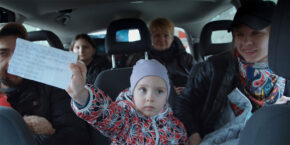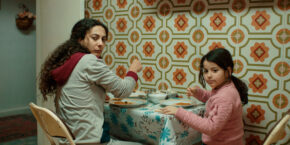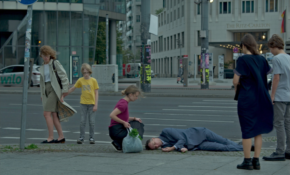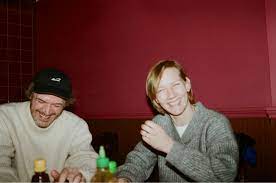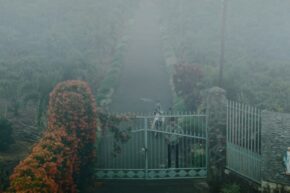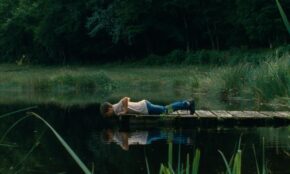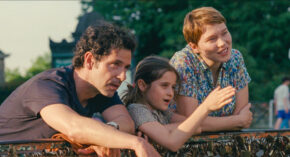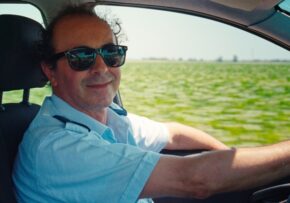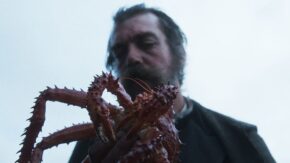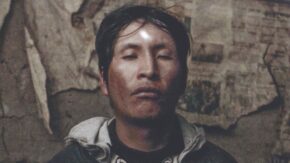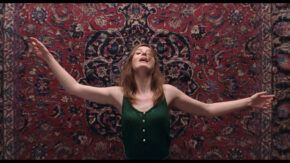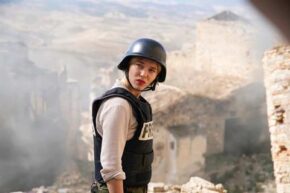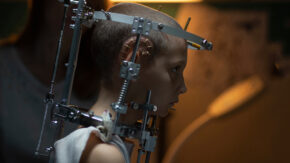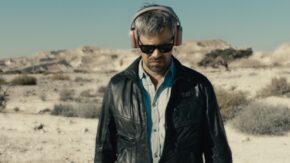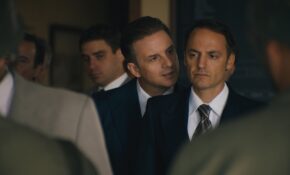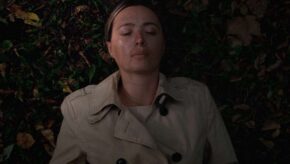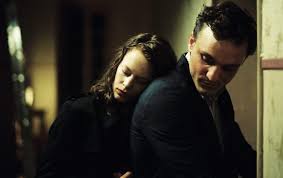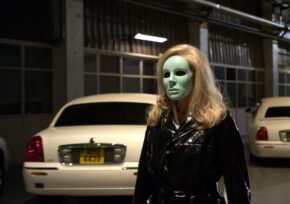France
TIFF 2023 | Bouquets 31-40 (Rose Lowder, France) — Wavelengths
By Phil Coldiron | 09/05/2023 | Cinema Scope Online, Columns, CS96, From Cinema Scope Magazine, TIFF 2023
Across 50 years of avowedly experimental practice—“experimental” in the sense that failure is a welcome possibility—she has advanced and refined our understanding of the mechanics of film as much as anyone working today. Naturally, she remains relatively unknown in North America. Born and raised in the Andes, trained industrially on English editing tables, and residing in Provence since the mid-’70s, Lowder has sought, with singular focus, levels of expressive precision beyond the single frame.
Read More → TIFF 2023 | Do Not Expect Too Much from the End of the World (Radu Jude, Romania/Luxembourg/France/Croatia) — Wavelengths
By Jordan Cronk | 09/05/2023 | Cinema Scope Online, CS96, From Cinema Scope Magazine, Interviews, TIFF 2023
Where for many filmmakers the pandemic discouraged production or curbed creativity, it only seems to have inspired Radu Jude. Always impossible to peg, the prolific 46-year-old Romanian director has grown especially wily and provocative in recent years, embarking on a new phase in his career in which contemporary image culture and the sociopolitical absurdities of our time have become both subject of meticulous analysis and object of equally attentive ridicule.
Read More → TIFF 2023 | God Is a Woman (Andrés Peyrot, France / Switzerland / Panama) — TIFF Docs
By Angelo Muredda | 09/05/2023 | Cinema Scope Online, TIFF 2023
French filmmaker and ethnographer Pierre-Dominique Gaisseau’s unfinished portrait of the Kuna people becomes the scene of a postcolonial autopsy in Andrés Peyrot’s absorbing documentary God Is a Woman. Peyrot’s film follows the contemporary interventions of Kuna elders and intellectuals such as poet and professor Arysteides Turpana and filmmaker Orgun Wagua, who seek to restore, contextualize, and screen Gaisseau’s footage to the community whose images were distorted and plundered for Western consumption in the original, unreleased documentary.
Read More → TIFF 2023 | In the Rearview (Maciek Hamela, Poland/France/Ukraine) — TIFF Docs
By Angelo Muredda | 09/05/2023 | Cinema Scope Online, TIFF 2023
Polish documentarian Maciek Hamela captures the devastation as well as the complicated hope of life in transit in In the Rearview, a record of his efforts to transport hundreds of Ukrainian refugees into Poland following the Russian invasion in early 2022.
Read More → TIFF 2023 | Inshallah a Boy (Amjad Al Rasheed, Jordan/France/Saudi Arabia/Qatar/Egypt) — Centrepiece
By Michael Sicinski | 09/05/2023 | Cinema Scope Online, TIFF 2023, Uncategorized
An unassuming feminist drama that sneaks up on you, Inshallah a Boy lays out the facts of sexism in Jordan with precision, communicating its protagonist’s exhaustion directly to the viewer.
Read More → TIFF 2023 | Last Summer (Catherine Breillat, France) — Special Presentations
By Madeleine Wall | 09/05/2023 | Cinema Scope Online, CS96, Currency, From Cinema Scope Magazine, TIFF 2023
This year, the ever-industrious Saïd Ben Saïd has commissioned Catherine Breillat—for the 75-year-old director’s first film since 2013’s autobiographical Abus de faiblesse—not to specifically reimagine the story of Phaedra à la her other literary adaptations, but rather to remake May el-Toukhy’s 2019 Danish film Queen of Hearts, in which a successful lawyer has an affair with her adolescent stepson.
Read More → TIFF 2023 | Music (Angela Schanelec, Germany/France/Serbia) — Wavelengths
By Phil Coldiron | 09/05/2023 | Cinema Scope Online, CS94, TIFF 2023
The compositional tropes of various high modernists, Bresson above all, loom large. Schanelec’s invention, instead, is tonal, a chording of irony and earnestness which allows her to handle the hottest emotions without ever being burned. Taken in other terms, this too looks more like refinement than invention: she is alone among her contemporaries in her capacity to reconcile the Apollonian and the Dionysian.
Read More → TIFF 2023 | Orlando, My Political Autobiography (Paul B. Preciado, France) — Wavelengths
By Holden Seidlitz | 09/05/2023 | Cinema Scope Online, CS96, Currency, From Cinema Scope Magazine, TIFF 2023
As the set is transformed in plain sight, the meta elements dissolving into a concentrated fantasy, the filmmaker’s own voice replaces the actor’s. Unseen, Paul B. Preciado asserts that, in Woolf but perhaps in general, “the first revolutionary metamorphosis is poetry,” which he defines as “the possibility of changing the names of all things.”
Read More → Anatomie d’un chute (Justine Triet, France)
By Aurelie Godet | 06/20/2023 | CS95, Festivals, From Cinema Scope Magazine, Spotlight
Anatomie d’un chute is her fourth feature, and, like all of her work, it shows a keen interest in the chaos of interwoven movements both toward and away from others that humans somehow revel in testing and rearranging, as if unable to figure out the big picture—and in spite of the confusion they keep inflicting on themselves. Never before, though, has Triet displayed such analytical rigour in laying out the ramifications of her premise and reassembling them in a harmonious exposé.
Read More → Inside the Yellow Cocoon Shell (Pham Thien An, Vietnam/Singapore/France/Spain)
By Robert Koehler | 06/20/2023 | CS95, Festivals, From Cinema Scope Magazine, Spotlight
Cinema has always had to defend itself against the pressures of business and capital, and yet, because filmmaking remains expensive (contrary to the false digital fantasies of “cheap” cameras), it is business and capital that continues to keep cinema going. This contradiction of conditions deepens when the filmmaking takes place in a communist-governed nation like Vietnam, where capital operates (albeit sometimes uneasily) within a state-run system.
Read More → Astrakan (David Depesseville, France)
By Jay Kuehner | 06/20/2023 | CS95, Currency, From Cinema Scope Magazine
By Jay Kuehner The reassurance implicit in the coming-of-age story is that of things foregone, universal, known; the particularities of the passage are shorn of their severity and exigence. The subject is supposed, invariably, to have arrived, their journey ultimately delineated in retrospect. The entropy of heightened subjectivity is at last externalized and made legible.…
Read More → <em>Un beau matin</em> (Mia Hansen-Løve, France/UK/Germany)
By Holden Seidlitz | 03/24/2023 | CS94, Currency, From Cinema Scope Magazine
...there are instances where autofiction permits storytellers to forget the structural demands of narrative, a fate which befalls the French filmmaker Mia Hansen-Løve in her latest feature, Un beau matin,whose pat ending doesn’t suit her characters so much as her own memory.
Read More → The Adventures of Gigi the Law (Alessandro Comodin, Italy/France/Belgium)
By Jay Kuehner | 01/10/2023 | CS93, From Cinema Scope Magazine, Spotlight
Not since Corneliu Porumboiu’s Police, Adjective (2009) has a cop movie been so sublimely uneventful as Alessandro Comodin’s The Adventures of Gigi the Law, a slack portrait of an affable officer in Friuli’s polizia locale. Pier Luigi Mecchia (a.k.a Gigi)—the director’s real-life uncle, effectively playing himself—performs his perfunctory patrol in the town of San Michele al Tagliamento, but Comodin’s film is more modern pastoral than police procedural.
Read More → Stars at Noon (Claire Denis, France)
By Giovanni Marchini Camia | 06/21/2022 | CS91, Festivals, From Cinema Scope Magazine, Spotlight
After waiting 34 years to return to the Cannes Competition, Claire Denis deserved a warm welcome back. Instead, she got to be the chosen victim of the Brown Bunny Syndrome, the annually recurring compulsion among festival attendees to proclaim a film as the worst ever to compete for the Palme d’Or. Although she received some vindication from the jury, who awarded her the Grand Prix (ex aequo, but still…), the critical vitriol is baffling.
Read More → Festivals: Berlin | A Flower in the Mouth (Éric Baudelaire, South Korea/France/Germany)
By Deragh Campbell | 03/21/2022 | CS90, Festivals, From Cinema Scope Magazine
Screening in this year’s Berlinale Forum, Éric Baudelaire's unique take on Luigi Pirandello’s 1923 short play The Man with the Flower in His Mouth assumes the form of a diptych: the first part is an observational documentary of Bloemenveiling Aalsmeer, the world’s largest flower market in the Netherlands; the second, a fictional, more explicit adaptation of Pirandello’s text, a conversation taking place over an evening in a Paris bar.
Read More → The Tale of King Crab (Alessio Rigo de Righi, Matteo Zoppis, Italy/France/Argentina)
By Jay Kuehner | 03/21/2022 | CS90, Currency, From Cinema Scope Magazine
Rigo de Righi and Matteo Zoppis expand and deflate, by slyly cinematic means, upon a tradition of racconti popolari and fiabe.
Read More → El Gran Movimiento (Kiro Russo, Bolivia/France/Qatar/Switzerland)
By Jay Kuehner | 01/04/2022 | CS89, Fall Festival Spotlight, Festivals, From Cinema Scope Magazine, Spotlight
By Jay Kuehner The tacit assumption of the “city symphony” is of a metropolis invariably harmonious, conducive to and cooperative with the machinations of both camera and director, the coalescence of an industrial apparatus. Kiro Russo’s native La Paz defies any such arrangement in El Gran Movimiento, which channels the inherent dissonance and manifest disparity…
Read More → A Night of Knowing Nothing (Payal Kapadia, India/France)
By Erika Balsom | 01/04/2022 | CS89, Fall Festival Spotlight, Festivals, From Cinema Scope Magazine, Spotlight
The sleep of reason produces monsters—or so said Francisco Goya, who used the phrase as the title of an aquatint published in 1799. The words appear as if etched into the side of a desk, atop of which a male figure slumps in slumber. From behind him, the menace comes: bats, owls, and cats emerge from the darkness with petrifying gazes, crowding around the man.
Read More → The Worst Person in the World (Joachim Trier, Norway/France/Sweden/Denmark)
By Beatrice Loayza | 01/04/2022 | CS89, Currency, From Cinema Scope Magazine
Desire tends to figure as a destructive force in the work of Joachim Trier. Anders (Anders Danielson Lie), the protagonist of Oslo, August 31 (2011), is a recovering drug addict who, by the end of the film, slips back into his old ways after a day of morale-crushing confrontations with his past.
Read More → France (Bruno Dumont, France)
By Lawrence Garcia | 09/20/2021 | CS88, Festivals, From Cinema Scope Magazine, Spotlight
the seven years since P’tit Quinquin, it has become impossible to continue tagging Bruno Dumont with the longstanding clichés of Bresson criticism. Epithets like “ascetic,” “severe,” “punishing”—already limited descriptors of his first two works, La vie de Jésus (1997) and L’humanité (1999)—have only become more obviously incapable of describing Dumont’s recent films, from the carnivalesque contortions of Ma Loute (2016) to the musical extremes of his Jeanne d’Arc movies.
Read More → Titane (Julie Ducournau, France/Belgium)
By Phil Coldiron | 09/20/2021 | CS88, Festivals, From Cinema Scope Magazine, Spotlight
The erotic history of the car in cinema extends back nearly to the dawn of the medium: there’s Chaplin, in 1914, asserting in his first film that he’s a more enticing view than the soapbox derbies at the Kid Auto Races (no engines yet).
Read More → Ahed’s Knee (Nadav Lapid, France/Israel/Germany)
By James Lattimer | 09/20/2021 | CS88, Festivals, From Cinema Scope Magazine, Spotlight
might leave a bigger scar. The Kindergarten Teacher (2014) and Synonyms (2019) already flirted with autobiography, but his fourth feature pushes forward into full autofiction, sending a director named Y. (Avshalom Pollak) to the Arava desert for a screening of one of his films, only to discover that open discussion of its content is frowned upon.
Read More → Azor (Andreas Fontana, Switzerland/France/Argentina)
By Jay Kuehner | 06/15/2021 | CS87, Currency, From Cinema Scope Magazine
Mark Twain’s quote that virtue has never been as respectable as money could easily delineate the sumptuously sordid habitat limned in Azor, except that it's precisely the kind of wisdom that the film’s wealthy habitués and their attendant financiers might invoke with complacent irony from within their insulated milieu of smoky parlours, agapanthus-lined lobbies, manicured hippodromes, and dutifully swept piscinas.
Read More → New Order (Michel Franco, Mexico/France)
By Adam Nayman | 06/15/2021 | CS87, Currency, From Cinema Scope Magazine
“Mexico’s upper classes are asking for trouble,” Michel Franco told Variety last fall. With New Order,trouble has found them. The deep-crimson dress selected by prosperous newlywed Marianne (Naian González Norvind) for the lavish post-wedding party at her family’s spotless steel-and-glass estate is couture at its most ominous; don’t look now, but there will be blood.
Read More → Beginning (Dea Kulumbegashvili, Georgia/France)
By Lawrence Garcia | 12/22/2020 | CS85, Fall Festival Spotlight, Festivals, From Cinema Scope Magazine
By Lawrence Garcia Beginning opens with a sermon on the Old Testament tale of Abraham and Isaac, delivered to a Jehovah’s Witness congregation in Georgia’s predominantly Orthodox Christian Caucasus region. Just as the preacher, David (Rati Oneli), starts to expound on its implications regarding belief, the Kingdom Hall is firebombed by unseen attackers, transforming the…
Read More → Transit (Christian Petzold, Germany/France)
By James Lattimer | 09/28/2018 | CS76, Currency, From Cinema Scope Magazine
By James Lattimer Christian Petzold’s progressive drift away from realism gathers pace in Transit, another melodrama of impossibility and despair that unfolds in a hyper-constructed amalgam of past and present as unstable as it is seamless. Yet the deliberately unresolved tension between ’40s Marseille and today is hardly the only element of slippage in the…
Read More → The Load (Ognjen Glavonic, Serbia/France/Croatia/Iran/Qatar)
By Azadeh Jafari | 09/28/2018 | CS76, Currency, From Cinema Scope Magazine
By Azadeh Jafari The debut fiction feature by Ognjen Glavonic is the second time that the Serbian writer-director, who lived through the Yugoslav wars as a child, has explored the same shocking incident from the time of the Kosovo conflict. In his feature-length documentary Depth Two (2016), he mixed spoken testimonies from those involved with…
Read More → Passion (Brian De Palma, France/Germany)
By Andrew Tracy | 03/20/2013 | CS54, Currency, From Cinema Scope Magazine
By Andrew Tracy Allow for the possibility that perspective can trump prejudice, I suppose. Eight months after seeing Brian De Palma’s Passion and thinking it ludicrous (probably intentional) and dreadful (presumably not), I’ve since scaled it back to the former—though the fact that it isn’t dreadful does not ipso facto mean it’s any fucking good.…
Read More → Holy Motors (Leos Carax, France)
By Dennis Lim | 06/24/2012 | CS51, Festivals, From Cinema Scope Magazine, Spotlight
By Dennis Lim The media gauntlet is so much a part of the Cannes infrastructure that Leos Carax’s decision to withdraw from it was both bold and telling. Despite having one of the most talked-about films at this year’s festival with Holy Motors, Carax granted no interviews, and his public pronouncements were confined to a…
Read More → 



